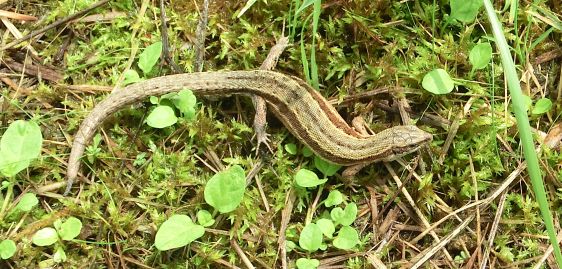RESEARCH INTERESTS
Summary
My interests lie in experimentally understanding the traits linked to organisms' success in a warming climate at various levels of biological organization, and with different biological models. Using semi-natural mesocosm experiments, I have studied the impacts of climate change on common lizards from the individual level – which phenotypic traits are linked to individual success – to the population and community level. I now use the same experimental set up to study climate change consequences on predator-prey interactions using terrestrial arthropods as a model. Finally, I have also worked on aquatic ecosystems, through lab- and mesocosms-based experiments, specifically investigating the traits linked to competition between species in different climatic conditions in phytoplankton communities, and to how climate and habitat fragmentation shape phytoplankton and zooplankton communities.
Arthropod project
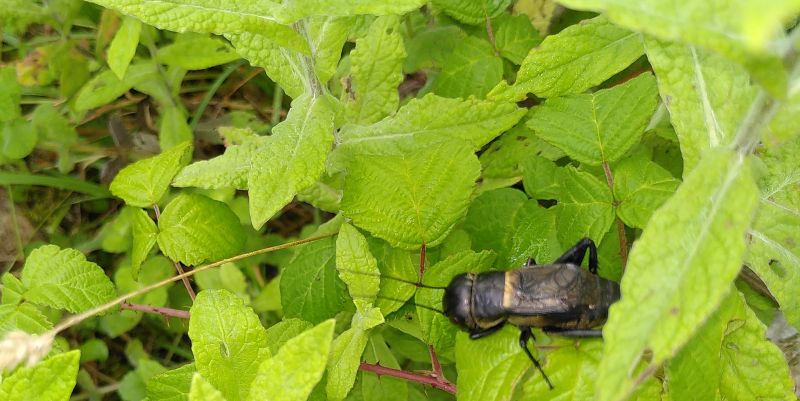
The current climatic crisis makes the understanding of its impacts on community functioning all the more urgent. Such an understanding is hampered by the complexity of species relationships. Predator-prey interactions are driven by consumptive and non-consumptive effects. Predators impact prey density through consumptive effects, but their mere presence can lead the prey to change their behaviour and physiology through non-consumptive effects. Such consumptive and non-consumptive effects are key to community dynamics and can be altered by climate. Climate change can increase predator metabolism and energetic demands, and thus their consumption rate. This can in return change prey behaviour and physiology in presence of predators and thus affect their population dynamics. Despite their well-demonstrated importance in ecology and evolution, non-consumptive effects are often ignored when making predictions about future biodiversity.

Through experiments on terrestrial arthropods, we aim at understanding how changes in consumptive and non-consumptive effects of predators on prey can contribute to the impacts of climate change on biodiversity. We work at the Metatron, an experimental system composed of 48 interconnected semi-natural enclosures in which climatic conditions can be manipulated. We take advantage of a long-term warming experiment on the adaptation of common lizards to warmer climates has been running since 2015 to study the adaptation of other components of the ecosystem, namely terrestrial arthropods.
We aim at (1) understanding how adaptation to warmer climates affect predator and prey thermal physiology in terrestrial arthropods, (2) understanding the impacts of such adaptation on consumptive and non-consumptive effects, and (3) understanding the impacts of climate on the functioning of more complex communities through changes in consumptive and non-consumptive predator-prey interactions.
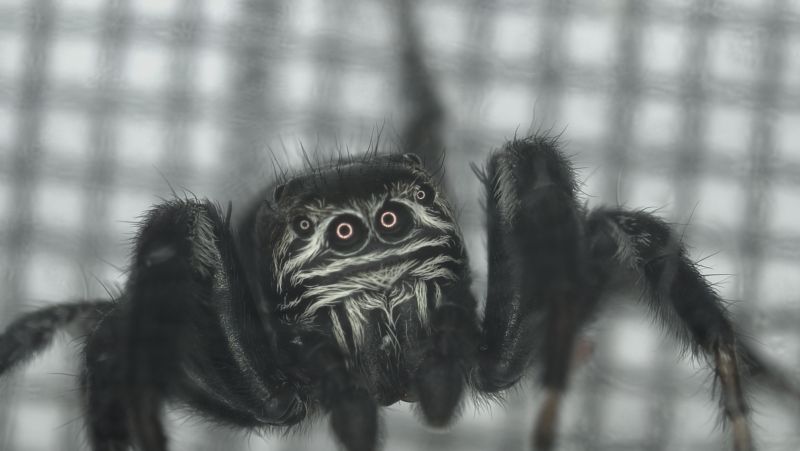
Funding: ANR CLIMPREDPREY (Climate change impacts on predator-prey relationships).
Collaborators: Nicolas Mouret (PhD Student, co-supervisors: Julien Cote, Elvire Bestion), Laura Kouyoumdjian (technician), Julien Cote, Delphine Legrand
Phytoplankton projects
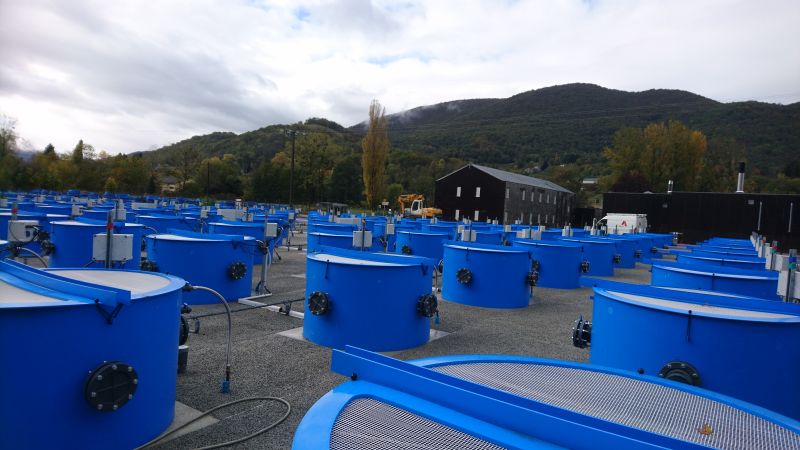
Climate change and habitat fragmentation are the largest threats to ecosystem globally. However, not all species are expected to respond equally, leading to widespread changes in community composition and ecosystem functioning. Working as a postdoc with José Montoya at the Station d’Ecologie Théorique et Expérimentale, I aimed at better understanding the role of climatic warming and habitat fragmentation on biodiversity, community dynamics and ecosystem functioning in multitrophic freshwater communities. We used the Aquatron, an experimental system composed of connected ponds in which temperature can be manipulated, to understand how phytoplankton and zooplankton communities respond to long term warming and fragmentation treatments.
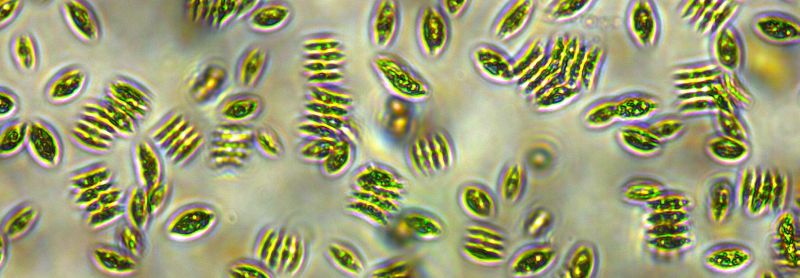
At Exeter University, I worked as a postdoc with Gabriel Yvon-Durocher and Samraat Pawar to develop laboratory experiments with a wide range of freshwater phytoplankton taxa to characterize the physiological traits (e.g. thermal dependency of growth, photosynthesis and respiration) favouring competitive abilities in a warming climate.
I also collaborated with Elisa Schaum to better understand how evolutionary history to shape species responses to climate change.
Lizard project
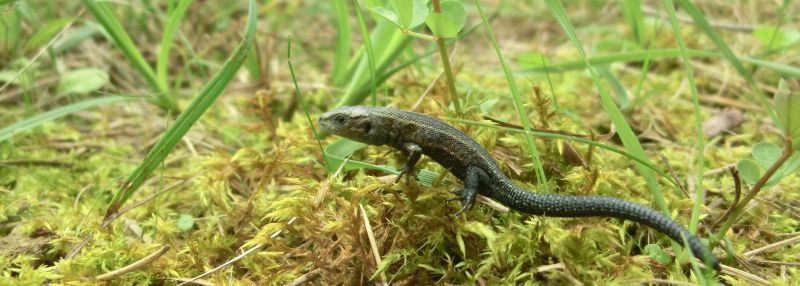
My work with Julien Cote focused on the impacts of climate change on the common lizard Zootoca vivipara, both at the population level – impact of temperature on lizard population and metapopulation dynamics and persistence – and at the individual level – how individual phenotype plays a role in adaptation to climatic conditions.
We worked at the Metatron, and created several lizard populations in enclosures differing for their temperature. We monitored lizard life history (dispersal, survival, growth and reproduction) and we quantified populations' phenotypic variation (melanism, preferred temperatures). We aimed at understanding the influence of dispersal, selection and plasticity on adaptation to climate change.
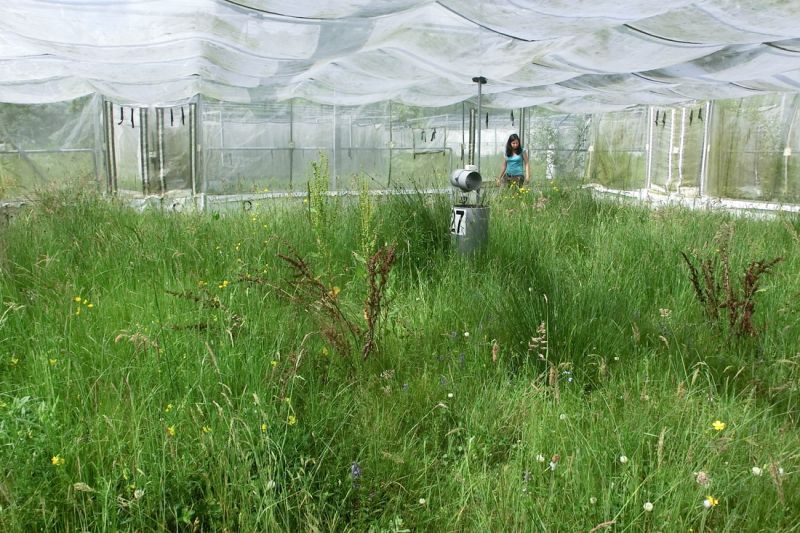
We further studied how climate change affected lizards’ interactions with other components of the community. We particularly studied how warmer climates affected their diet, as well as their gut microbiota.
Other projects
Other interests include the impacts of predation risk on lizard behaviour and phenotype. Specifically I worked on the maternal effects of predation risk on offspring phenotype and dispersal. Collaborations include a work on the non consumptive impacts of top predator cues on four-level food webs.
I also studied both dispersal and the consequences of habitat fragmentation through several review articles, with specific collaborations with Delphine Legrand, Julien Cote and Staffan Jacob.
Finally on the modelling side I developed a project with Robin Aguilee, Julien Cote and Felix Pellerin, on the impact of phenotype- and condition-dependent dispersal on climate-driven range shifts. A past work with Jean Clobert and Sylvain Moulherat focused on the development of an individual-based model of metapopulation dynamics integrating dispersal in an explicit landscape to serve as a flexible platform for Population Viability Analysis.
Keywords
climate change – population dynamics – dispersal – metapopulations – predation risk – non-consumptive effects – communities – thermal physiology – habitat fragmentation – personality – maternal effects – lizards – phytoplankton – arhtropods
SUMMARY C.V.
Positions and Education
2021-Present
CNRS Researcher
Station d'Ecologie Théorique et Expérimentale, CNRS, Moulis, France
2018-2021
Postdoctoral Researcher
Impact of climate change and habitat fragmentation on freshwater planktonic communities
Station d'Ecologie Théorique et Expérimentale, CNRS, Université Paul Sabatier, Moulis, France
Supervisor : José Montoya
2018 May-July
Study engineer (Ingénieure d’études)
Field work on the Metatron project
Laboratoire Evolution et Diversité Biologique, Université Paul Sabatier, Toulouse, France
Supervisor: Julien Cote
2015-2018
Associate Research Fellow
Can metabolic traits limit species invasions under climate change?
Environment and Sustainability Institute, University of Exeter, UK
Supervisors: Gabriel Yvon-Durocher and Samraat Pawar
2011-2015
PhD Student
Impact of climate change on a vertebrate ectotherm: from individuals to the community
Station d’Ecologie Expérimentale du CNRS, USR 2936, Moulis, France
Supervisors: Julien Cote and Jean Clobert
Graduate Teaching Assistant at Université Paul Sabatier, Toulouse, France
2011
M.Sc in Ecology
Development of a spatially explicit individual-based model of population dynamics to conduct Population Viability Analysis
Supervisor: Sylvain Moulherat
Université Paul Sabatier, Toulouse, France
Teaching
Impacts of Climate Change – from populations to species (first year Master, 2 h lectures, SETE Moulis, 2022-2025)
The Effects of Global Change on Ecosystems (Master degree, 2h lectures+ 4h tutorial, 2019-2023)
Formation Expérimentation Animale Faune Sauvage: Non-invasive practices on reptiles (Professional formation, MNHN, 3h tutorials, 2022-2025)
Practical skills in ecology Iceland field course (2nd year Bachelor, 2h lectures (consumer-resources interactions) + 48h tutorials, Exeter University, 2017)
Climate change ecology (Bachelor degree, 2016, 4h)
Demographics and Population dynamics (Master degree, 2012-2014, 20h tutorials)
Population Genetics (Master degree, 2013, 8h tutorials)
Plant biology (Bachelor degree, 2014, 46h tutorials)
Ornithology (Bachelor degree, 2014, 12h tutorials)
Experimental Ecology (High school teachers, 2013, 6h lecture+tutorials)
Supervision
PhD student co-supervision
Nicolas Mouret (2022-ongoing, Co-supervisors : Julien Cote and Matthieu Paquet) – Climate change and intraspecific behavioural variation : from ontogeny to senescence
Technical staff supervision
Laura Kouyoumdjian (2022, 5 months) – Technical aid for experiments on thermal physiology of arthropods
Intern supervisions and co-supervisions
Oriane Bousquet--Lagarrigue (Master 2, 2025) – Impacts of climatic conditions on common lizard sexual behaviour (Co-supervisors: Julien Cote and Emma Fromm)
Fanny Lepage (Master 1, 2024) – Consequences of climate change for Pardosa’s activity and predation (Co-supervised with Nicolas Mouret)
Maryla Guilhot (Master 1, 2024) – Impacts of climate change on the personality of phytophagous prey (Co-supervised with Nicolas Mouret)
Marine Güell (Master 2, 2022) – Impacts of population density on a lizard behaviour (Co-supervisors: Julien Cote and Matthieu Paquet)
Saskia Johnson (3rd year, 2016-2017) – Thermal-and-nutrient-dependent photosynthesis
Emily Budd (3rd year, 2015-2016) – Temperature-dependent nutrient physiology of phytoplankton
Felix Pellerin (Master 2, 2015) – dispersal phenotypic syndromes and climate change: a modelling approach (Co-supervisors: Robin Aguilée and Julien Cote)
Lucie Di Gesu (Master 2, 2014) – Global warming and host-microbiota interactions in an ectotherm species (Main supervisors: Julien Cote and Joel White)
Erika Beaugeard (Licence 3, 2014) – Climate change and lizard natal dispersal
Aude Benhemma-Le Gall (Master 1, 2014) – Maternal effects on lizards thermal preference
Antoine Cave (Licence 3, 2013) – Climate change and lizard microhabitat choice
Bastien Remurier (Licence 3, 2013) – Heritability of lizard exploratory behaviour
Romain Chazal (Master 1, 2012) – Thermal preferences and personality in the common lizard
Remi Patin (Licence 3, 2012) – Thermal melanism and gestation in the common lizard
Field assistants
Mattéo Riss (Licence 3, 2023) - Rogini Runghen (Master 1, 2014) - Marion Garacci (Master 1, 2014) - Marlene Kleffert (Master 1, 2014) - Loreleï Boyer (Licence 1, 2014) - Laure Geidel (Licence 3, 2013) - Alice Fournier (Licence 3, 2013) - Marion Segall (Master 1, 2012) - Julie Siracusa (Master 1, 2012) - Julie Raphalen (Master 1, 2012) - Cyrille Camuel (Licence 3, 2012)
Others
Member of Felix Pellerin’s (2015-2018), Zoé Rousset’s (2023-ongoing), Mateo Millet (2025-ongoing) and Andrea-Marie Lambert (2025-ongoing) PhD committee
Member of the Jury of Chloé Chabaud’s (2023-04-21), Simon Bazin’s (2024-02-20) and Théo Bodineau’s (2024-12-19) PhD defense
Grants, Awards and Funding
2023 : ANR JCJC CLIMPREDPREY
2016: Prix Le Monde de la Recherche Universitaire
2016: Young Researchers Award of the Bettencourt Schueller Foundation (25 000 €)
2011-2014: PhD supported by the French Ministry of Higher Education and Research
Oral communications and posters
Invited speaker at EAWAG Seminar, Dübendorf, Switzerland, 2025. Climate change impacts: from the individual to the community.
Presentation at the EVENET symposium, Ghent, Belgium, 2024. Species interactions affect dispersal: a meta-analysis.
Invited speaker at Jour Fixe Seminar, Konstanz, Germany 2021. Impacts of climate change on phytoplankton communities
Invited speaker at the Congrès de la Société Herpétologique de France 2019, Moulis, France. Impact of climate change on trophic interaction and gut microbiota of common lizards.
Poster at the Evolution Conference 2018, Montpellier, France. Phenotypic plasticity mediates responses to climate change: a semi-natural experimental approach.
Poster at the Ecology Across Border Conference 2017, Ghent, Belgium. Metabolic traits predict the effects of warming on phytoplankton competition.
Oral communication at the BES 2016 Conference, Liverpool, UK. How does temperature-dependence of nutrient physiology shape competition in phytoplankton?
Invited speaker at the World Congress of Herpetology 2016, Hangzhou, China. Climate impacts on a lacertid lizard: from the individual to the community.
Invited speaker at the BES 2015 Conference, Edimburgh, UK. Live fast, die young: experimental evidence of population extinction risk due to climate change. Chair of the Global change Ecology: Warming and thermal adaptation session.
Oral Communication at the Habitat Fragmentation workshop 2014, Moulis, France. Impact of climate change in a fragmented habitat.
Oral Communication at the Movement and Dispersal Conference 2013, Aberdeen, UK. Maternal exposure to predators: how to prepare offspring to a risky natal environment?
Poster at the ESEB Conference 2013, Lisbon, Portugal. Maternal exposure to predators: how to prepare offspring to a risky natal environment?
Popular science
Books:
Book "Prix Le Monde de la recherche 2016" from Cedric Villani, Claire de March, Julien Jouganous, Barine Bézagu, Rémi Louf, Elvire Bestion. Eds Le Pommier, in which I have written a chapter entitled "Le futur incertain des lézards face au changement climatique"
Radio shows:
Les effets du changement climatique sur le microbiote. CQFD Radio Television Suisse 1ere
TV shows:
Aquatron, pour expérimenter le changement climatique Universcience leblob.fr (2022)
Le Metatron, une nature en cages CNRS Images
Le Metatron, un simulateur de réchauffement climatique. Journal 20h TF1 (2014)
Animaux à la loupe. Journal 19|20 France 3 (2022)
Others:
Since 2025, member of the scientific council of “Les Petits Débrouillards Occitanie”, a non-profit organization aiming at sharing scientific culture aimed at a younger public
Interview for Pyrénées magazine for the article “Voyage au centre de la science” (22/10/2025)
Outreach lectures to 2nde students from the Lycée du Couserans on biodiversity and climate change (2024-2025).
Fête de la Science à la SETE 2022 - presentation of the Metatron and the Aquatron to the public
Fête de la Science au Muséum de Toulouse 2020 - three outreach conferences on the impacts of climate change
7emes Rencontres avec les Scientifiques du Parc Naturel Régional des Pyrénées Ariégeoises, Saint Girons 2019 - outreach conference on the impacts of climate change
Rencontres eXploreur Foix 2019 - outreach conference on the impact of climate change on common lizards
Video illustrating adaptation and plasticity in a climate change context for Belin éducation (eds Humensis) 2019 book for the SVT 2nde French school program
Outreach article for secondary school teachers on planet-vie.ens.fr (in French): Étudier l’impact du changement climatique sur un vertébré ectotherme : de l’individu à la communauté
Environmental and Sustainability day 2017 - teaching science to schoolchildren
Cafe Scientifique Talk - Wild Film Festival 2016
Fête de la Science 2013
Media interest for my publications: the Bestion et al 2021 PNAS paper was featured in CNRS INEE and Techno-science.net. The Bestion et al 2019 Proceedings B paper was featured in several publications (20 minutes - International Business Times - Phys.org - The Asian Age - CNRS). The Bestion et al 2017 Nature Ecology and Evolution paper received a wide media coverage (The Scientist - Daily Mail - International Business Times - Popular Science - Nature Ecology and Evolution blog - Phys.org - Earth.com - EurekAlert - UPI (English) - CNRS - 20 minutes - Ouest France - La Depeche - CQFD Radio Television Suisse 1ere (French)). The Schaum et al 2017 Nature Ecology and Evolution was featured in Nature Ecology and Evolution blog - Technology.org - Health Medicine Network - Phys.org - EurekAlert!. The Bestion et al 2015 Plos Biol paper received a wide media coverage (Science Daily - Phys Org - TechTimes - Iscience- Western Daily Press - Climate News Network- The Wildlife Society - Nature World News - Cornish Guardian - Yahoo News - Plos Biologue (English) Le Monde - RTBF - CNRS INEE - Exploreur - Futura Sciences - Europe1 (French)). The Bestion et al 2015 Ecology Letters paper was featured in 5 publications (Iscience - Cornish Guardian - Conservation Corridor (English) - CNRS INEE - Futura Sciences (French)). The Bestion et al 2015 Oikos paper was discussed in a blog note (Oikos blog). The Bestion et al 2014 PRSB was featured in Sciences et Avenir
PUBLICATIONS
Richard, M., Garreau A., Bestion E., Cucherousset J., Montoya J.M. and Blanchet S.
(2025) - The Aquatic Metatron: A large-scale experimental facility to study the combined effects of habitat fragmentation and climate change on aquatic meta-ecosystems. - Methods in Ecology and Evolution.Fronhofer EA, Bonte D, Bestion E, Cote J, Deshpande JN, Duncan AB, Hovestadt T, Kaltz O, Keith SA, Kokko H, Legrand D, Malusare SP, Parmentier T, Saade C, Schtickzelle N, Zilio G, Massol F.
(2024) - Evolutionary ecology of dispersal in biodiverse spatially structured systems: what is old and what is new? - 379: 20230142Bestion E, Legrand D, Baines CB, Bonte D, Coulon A, Dahirel M, Delgado M, Deshpande JN, Duncan AB, Fronhofer EA, Gounand I, Jacob S, Kaltz O, Massol F, Mathyssen E, Parmentier T, Saade C, Schtickzelle N, Zilio G, Cote J.
(2024) - Species interactions affect dispersal: a meta-analysis - Philosophical Transactions of the Royal Society B: Biological Sciences. 379: 20230127Thierry M, Cote J, Bestion E, Legrand D, Clobert J, Jacob S.
(2024) - The interplay between abiotic and biotic factors in dispersal decisions in metacommunities. - Philosophical Transactions of the Royal Society B: Biological Sciences. 379: 20230137Fromm E, Zinger L, Pellerin F, Di Gesu L, Jacob S, Winandy L, Aguilée R, Parthuisot N, Iribar A, White J, Bestion E, Cote J.
(2024) - Warming effects on lizard gut microbiome depend on habitat connectivity - Proceedings of the Royal Society B: Biological Sciences 291: 20240220San-Jose LM, Bestion E, Pellerin F, Richard M, Di Gesu L, Salmona J, Winandy L, Legrand D, Bonneaud C, Guillaume O, Calvez O, Elmer KR, Yurchenko AA, Recknagel H, Clobert J, Cote J
(2023) - Investigating the genetic basis of vertebrate dispersal combining RNA-seq,RAD-seq and quantitative genetics - Molecular Ecology 32(12):3060-3075 Bestion E., San-Jose L.M., Di Gesu L., Richard M., Sinervo B., Côte J., Calvez O., Guillaume O., Cote J.
Álvarez-Codesal, S., Faillace, C. A., Garreau, A., Bestion, E., Synodinos, A. D., & Montoya, J. M.
(2023) - Thermal mismatches explain consumer-resource dynamics in response to environmental warming - Ecology and Evolution 13, e10179Urban MC, Swaegers J, Stoks R, Snook RR, Otto SP, Noble DWA, Moiron M, Hällfors MH, Gómez-Llano M, Fior S, Cote J, Charmantier A, Bestion E, Berger D, Baur J, Alexander JM, Saastamoinen M, Edelsparre AH, & Teplitsky C.
(2023) - When and how can we predict adaptive responses to climate change? - Evolution Letters qrad038Bestion E., Teyssier A., Rangassamy M., Calvez O., Guillaume O., Richard M., Braem A., Zajitschek F., Zajitschek S., Cote J.
(2022) - Adaptive maternal effects shape offspring phenotype and survival in natal environments - The American Naturalist(2022) - Connectivity among thermal habitats buffers the effects of warm climate on life-history traits and population dynamics - Journal of Animal Ecology
(2022) - Presence of a resident species aids invader evolution - Limnology and Oceanography
Bestion E., Haegeman B., Alvarez Codesal S., Garreau A., Huet M.,
Barton S., Montoya J.M.
Bestion E., Barton S., García F.C., Warfield R. & Yvon‐Durocher G.
(2020) - Abrupt declines in marine phytoplankton production driven by warming and biodiversity loss in a microcosm experiment. - Ecology Letters 23: 457–466Moulherat S., Bestion E., Baguette M., Moulherat M., Palmer S.C.F., Travis J.M. et al.
(2020) - MetaConnect, a new platform for population viability modelling to assist decision makers in conservation and urban planning. - bioRxiv 890921Lachapelle J., Bestion E., Jackson E.E. & Schaum C-E.
(2020) - Presence of a resident species aids invader evolution. - bioRxiv 103978Bestion E., Soriano-Redondo A., Cucherousset J., Jacob S., White J., Zinger L., Fourtune L., Di Gesu L., Teyssier A. & Cote J.
(2019) - Altered trophic interactions in warming climates: consequences for predator diet breadth and fitness. - Proceedings of the Royal Society B: Biological Sciences 286: 20192227Bestion E., Cote J., Jacob S., Winandy L. & Legrand D.
(2019) - Habitat fragmentation experiments on arthropods: what to do next? - Current Opinion in Insect Science 35Pellerin F., Cote J., Bestion E. & Aguilée R.
(2019) - Matching habitat choice promotes species persistence under climate change - Oikos 128(2): 221-234García F.C., Bestion E., Warfield R. and Yvon-Durocher G.
(2018) - Changes in temperature alter the relationship between biodiversity and ecosystem functioning - PNAS 115(43): 10989-10994Bestion E., García-Carreras B., Schaum C.E., Pawar S. and Yvon-Durocher G.
(2018) - Metabolic traits predict the effects of warming on phytoplankton competition. - Ecology Letters 21(5):655-664Bestion E., Schaum C.E. and Yvon‐Durocher G.
(2018) - Nutrient limitation constrains thermal tolerance in freshwater phytoplankton - Limnology and Oceanography Letters 3(6): 436-443García-Carreras B., Sal S., Padfield D., Kontopoulos D.G., Bestion E., Schaum C.E., Yvon-Durocher G. and Pawar S.
(2018) - Role of carbon allocation efficiency in the temperature dependence of autotroph growth rates - PNAS 115(1): E7361-E7368Bestion E. and Cote J.
(2018) - Species Responses to Climate Change: Integrating Individual-Based Ecology Into Community and Ecosystem Studies - The Encyclopedia of the Anthropocene (eds. DellaSala, D.A. & Goldstein, M.I.). Elsevier, Oxford pp. 139–147Schaum C.-E., Barton S., Bestion E., Buckling A., Garcia-Carreras B., Lopez P., Lowe C., Pawar S., Smirnoff N., Trimmer M. and Yvon-Durocher G.
(2017) - Adaptation of phytoplankton to a decade of experimental warming linked to increased photosynthesis - Nature Ecology & Evolution 1: 0094Bestion E., Jacob S., Zinger L., Di Gesu L., Richard M., White J. & Cote J.
(2017) - Climate warming reduces gut microbiota diversity in a vertebrate ectotherm. - Nature ecology & evolution 1: 161Cote J., Bestion E., Jacob S., Travis J., Legrand D. and Baguette M.
(2017) - Evolution of dispersal strategies and dispersal syndromes in fragmented landscapes. - Ecography 40, 56-73Bestion E., Clobert J. & Cote J.
(2015) - Dispersal response to climate change: scaling down to intraspecific variation - Ecology Letters 18 (11): 1226-1233Jacob S., Bestion E., Legrand D., Clobert J. & Cote J.
(2015) - Habitat matching and spatial heterogeneity of phenotypes: implications for metapopulation and metacommunity functioning - Evolutionary Ecology 29(6): 851-871Bestion E., Teyssier A., Richard M., Clobert J. & Cote J.
(2015) - Live fast, die young: experimental evidence of population extinction risk due to climate change - Plos Biology 13 (10): e1002281Bestion E., Cucherousset J., Teyssier A. & Cote J.
(2015) - Non-consumptive effects of a top-predator decrease the strength of the trophic cascade in a four-level terrestrial food web - Oikos 124(12): 1597-1603Bestion E., Teyssier A., Aubret F., Clobert J. & Cote J.
(2014) - Maternal Exposure to Predator Scents: Offspring Phenotypic Adjustment and Dispersal - Proceedings of the Royal Society B: Biological Sciences 281(1792): 20140701Teyssier A., Bestion E., Richard M. & Cote J.
(2014) - Partners’ Personality Types and Mate Preferences: Predation Risk Matters - Behavioral Ecology 25 (4): 723–33BOOKS
Bestion E. and Cote J. (2018) - Species Responses to Climate Change: Integrating Individual-Based Ecology Into Community and Ecosystem Studies - The Encyclopedia of the Anthropocene (eds. DellaSala, D.A. & Goldstein, M.I.). Elsevier, Oxford pp. 139–147


